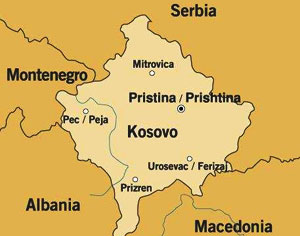
Shpend Ahmeti, Mayor of Kosovo's capital Pristina

FRONT PAGE
About us
 

Mayor of Pristina, Kosovo (01/2015)
Local government in The Americas:
| Argentina | Bolivia | Brazil | Canada | Caribbean | Chile | Mexico | Peru | USA | Venezuela |
Local government in Europe:
| Albania | Cyprus | France | Germany | Gibralta | Greece | Iceland | Ireland | Italy | Kosovo | Malta | Portugal | Russia | Spain | UK1 | UK2 |
Local government in Asia and Australia
| Australia | China | India | Indonesia | Japan | Malaysia | Philippines | Singapore | South East Asia | South Korea | Thailand | Turkey |
Local government in Africa
| South Africa |

Worldwide | Elections | North America | Latin America | Europe | Asia | Africa |


 




 













|
|
Local government in Kosovo:
Elected mayors are the key
By Tony Favro*
13 December 2014: Kosovo became the most recent territory in Europe to claim the status of nation state when it declared independence in 2008. The credibility of any democratic nation depends on the strength of the institutions it builds, notably its capacity to meet citizens’ demands for service delivery and accountability. To this end, Kosovo has embarked on a process of enhancing the performance capacity of government by decentralizing power from the national level to the municipal level. Decentralization is considered a tool to deliver results shaped by local needs and market realities, engage citizens in decision making, and bridge ethnic divisions. And directly-elected mayors assume a primary role in helping ensure accountability, transparency and responsibility.
• Background
• Local government
• Investment and development
• Elected mayors
Background
In 1974, the new Constitution of the former Republic of Yugoslavia transferred responsibilities for self-government to Kosovo, a region of about 10,000 square kilometers with a population of about 1.8 million, predominantly ethnic Albanians. The socialist Republic of Yugoslavia was comprised of six republics: Serbia, Montenegro, Slovenia, Croatia, Bosnia-Herzegovina, and Macedonia. Kosovo was an autonomous province of Serbia.
The regime of Slobodan Milosevic abrogated Kosovo’s autonomy in 1989, setting off a decade of repression and rebellion. Ethnic Albanians were banned from public education and jobs and subjected to acts of intimidation. Property ownership records in Kosovo were destroyed or transferred to Belgrade, the capital of Serbia. The repression was countered by reprisals, violent and nonviolent, on the part of the ethnic Albanians. Tensions escalated to war in 1999. Milosevic and the Serbs were defeated, and the United Nations began providing administrative support and military protection to the autonomous Government of Kosovo.
The Republic of Kosovo declared independence from Serbia in 2008 and signaled its intention to eventually join the European Union. With the help of the EU, UN, United States, and others, Kosovo is trying to rebuild its institutions to EU standards. The new Constitution of Kosovo and national laws provide a set of guidelines and rules for the citizens of Kosovo to take ownership of their new state at the community level, by encouraging active citizen participation; at the civil society level, by carving a role for the many NGOs that operate in the country; and at the government level. Perhaps the most important institution that is being rebuilt is local government. The Constitution states that “The Republic of Kosovo shall observe and implement the European Charter on Local Self-Government to the same extent as that required of a signatory state.” In other words, local officials in Kosovo must have the authority and responsibility to manage a substantial amount of their municipalities’ affairs in the interests of local residents.
 Local government Local government
Kosovo’s 2008 Law on Local Self-Government establishes a structure for local governance. The Law creates five new municipalities, and expands the borders of a sixth, primarily to meet community needs. Municipalities with Serb majorities that are created and function within the jurisdiction of the Republic of Kosovo receive enhanced competencies. Serbs in these areas may, for example, maintain their own educational and health care systems.
The Law on Local Self-Government gives all municipalities in Kosovo twenty-five major responsibilities, including the provision of clean drinking water, sewage treatment, waste management, adequate housing, efficient transport, a clean environment, educational and health services, and economic opportunities. For the first time, mayors are directly-elected. Previously, political parties ran for election with closed lists, and the majority party or coalition in the municipal assembly chose the mayor.
Jetmir Bakija of the Kosovo Democratic Institute**, a think tank which monitors and analyses the work of municipal and national governments to support good governance and democratic growth, says, “Developments in the past seven or eight years have been exciting because of needed local government reforms,” but, he adds, “decentralization is complex everywhere, progress is never constant, and many challenges remain in Kosovo.”
Investment and development
Perhaps the biggest challenge is that major responsibilities have been devolved from the national government to municipalities, but adequate resources—especially financial resources— have not necessarily followed. Municipalities have limited options for raising their own funds and depend on grants from the national government for the bulk of their revenues. Grants to municipalities total about one-third of the national budget, about a third of which are block grants with relatively general provisions about how the money can be spent. Most grants have tight strings attached. For example, local officials charged with managing teachers, health care workers, and other municipal employees are given a set amount of money for wages and have to adhere strictly to hiring and firing restrictions and salary lists from the national government. As a result, municipalities have limited ability to restructure their workforces.
Municipalities also have limited influence over capital investment. The national government determines the ownership rights of land, and, through the Kosovo Privatization Agency, privatizes much of the public land, with the proceeds going to the national rather than municipal governments. Along with a lack of adequate funding for infrastructure, municipalities are often faced with not having enough land for economic development, schools, hospitals, and other structures that are essential to improving public services. This also limits municipalities’ opportunities for creating viable public-private partnerships and public corporations. Despite these challenges, the amount of annual capital investment and the ability to implement capital investments have become major benchmarks of municipal efficacy and progress for government watchdog groups in Kosovo. Larger municipalities, especially, are expected to plan and deliver needed capital projects.
Ultimately, the citizens of Kosovo, like citizens everywhere, will judge the legitimacy of their local and national governments according to how well they deliver crucial, basic services. Legitimacy is a vital issue because many municipalities have to compete with parallel structures run by Serbia. The right for Serbia to establish such structures was sanctioned by the United Nations as part of the process that ended the war in 1999. For example, teachers in majority Serb communities are paid by the Serbian government and are under the orders of Serbia. Authorities in Kosovo cannot apply the Kosovo curriculum in these communities, nor can there be any cooperation between local schools and Kosovo authorities in charge of education in the rest of the country.
Parallel structures compete with and undermine the full autonomy of legitimate local government. The hope is that effective local service delivery that is directly felt and appreciated by the citizenry will cause the parallel Serbian structures to fade away.
Elected mayors
Mayors have become the hinge upon which local government pivots in Kosovo. According to Bakija of the Kosovo Democratic Institute, “with directly-elected mayors the chain of responsibilities are clear for executive decisions, and mayors have full accountability.”
All but two of the thirty-eight mayors in Kosovo have majorities or majority coalitions in their municipalities’ municipal assemblies. This had led to criticisms that municipal assemblies too often rubber stamp mayors, proposals, particularly the annual municipal budget. By law, a municipal assembly has one month to review the mayor’s proposed budget, consult the public, and approve or reject the budget. The compressed time frame and majority or coalition politics frequently discourage members of minority parties in the municipal assembly from participating in the budget process, effectively giving more power to mayors.
The power of mayors is increasingly sought to coordinate the agendas of donors. The United Nations, various Western governments, and numerous NGOs are active in Kosovo. These organizations pushed decentralization as a way of reducing the effects of socialist centralization. They are working with the national government and municipalities to build capacities and legitimize and entrench effective governance. Mayors are increasingly expected to take a leadership role in the often challenging task of ensuring that donors respond to citizens’ and municipalities’ needs rather than their own agendas.
By most accounts, mayoral relations with citizens have improved since 2008, and are continuing to improve, and the relationships extend beyond Albanian-majority municipalities. Mayors of new municipalities with Serb majorities have willingly taken on full responsibility for leading their municipalities. Fears that the Serbian community would not accept new municipalities have not come true. These municipalities have produced measurable results in terms of infrastructure improvements and economic development.
According to surveys by the Kosovo Democratic Institute, local government is now more trusted than the national government. The trust is translating into more engagement. Voter turnout for the 2013 elections was higher for municipal elections than for national elections, despite more extensive campaigning by national candidates than local candidates. Citizens’ expectations that their mayors deliver results also appear to be rising. In the 2009 elections, there was almost no turnover among mayors. In 2013, nine new mayors were elected in eighteen municipalities. Mayors are increasingly held accountable for their administrations’ performance.
Kosovo is committed to rebuilding its institutional framework according to the highest international standards. National and local governments are working together to mobilize and allocate resources and deliver higher-quality services. Mayors are at the forefront of the sensitive and complicated process of building a stable, prosperous nation that can negotiate volatile global markets and reap the dividends of democracy.
*Tony Favro recently returned from Kosovo where he helped municipalities and the national government with land use and zoning issues on a project supported by the United States Agency for International Development.
Selected Resources
Decentralization, A Heavy Weight to be Carried Out: Struggling to Move from Consolidation of Local Democracy to Better Service Delivery (Kosovo Local Government Institute 2011).
Decentralisation and Local Governance Reform: Clear on paper blurred in practice (Kosovo Local Government Institute 2010).
**Kosovo Democratic Institute: http://www.kdi-kosova.org/en/
|
|
|































